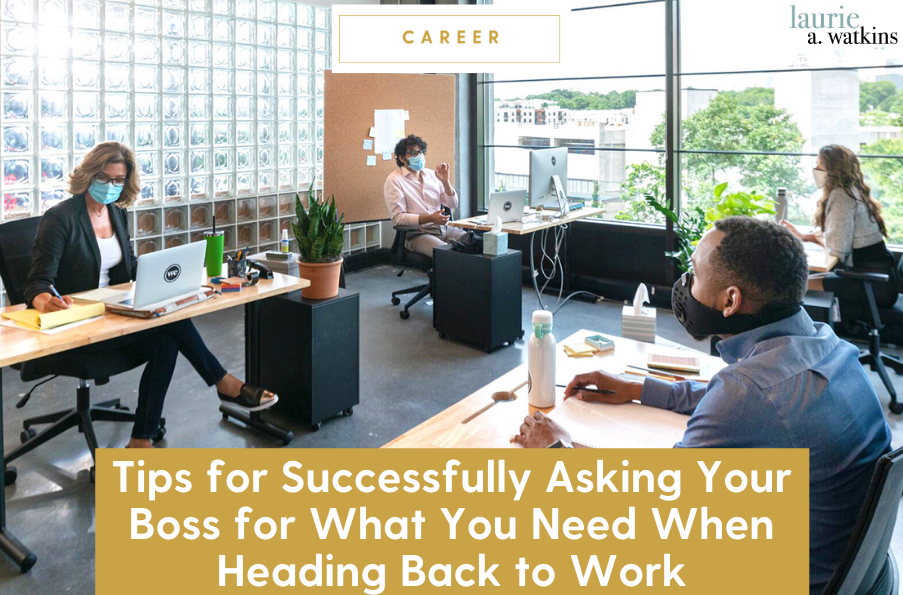We seem to be at a turning point with the covid-19 pandemic. People are getting vaccinated, restrictions are lifting, and things are opening up more and more.
With this reopening, and return to a somewhat sense of normal, there are businesses with various reopening practices and procedures.
Some places have already opened; some can but are choosing not to. Some situations require masks; some do not. This can be confusing, especially when there is conflicting information out there.
However, one thing that should not be confusing is speaking up for what you need if/when you return to work after working remotely.
As I wrote just a couple weeks ago on my blog, “A study out of China published in April found that 10.8% of people met the diagnostic criteria for post-traumatic stress disorder (PTSD) after returning to work. Following procedures like wearing face masks reduced psychiatric symptoms and made people feel more confident. It also helped when employers listened to the concerns of employees and made adjustments accordingly.” If it helps when employers listen to the concerns of employees, it is of utmost importance that you are able to communicate your concerns to your employer.
According to The Wall Street Journal, if employers are not following CDC and Prevention guidelines for a Coronavirus safe workplace, “First, bring up your concerns with your manager. If nothing changes, file a complaint with the Occupational Safety and Health Administration,” says Debbie Berkowitz, director of the Worker Health and Safety Program at the National Employment Law Project and a former OSHA chief of staff.
“You can opt to remain anonymous. The CDC’s guidelines are recommendations, so employers can’t be sanctioned just for violating them. But OSHA can determine whether those employers are violating its general-duty clause. And the agency is required to follow up on complaints, so the employer will at least be put on notice that workers are upset and willing to act,” Ms. Berkowitz says.
There are some questions you’ll likely want to ask your employer before returning to work so you know exactly what is happening and expected of you, as well as to make sure you feel comfortable:
Is it safe? You can simply ask about temperature checks, mask requirements, social distancing policies, hand washing breaks, an increase in hand sanitizer options, etc. You should make sure you are familiar with your employer’s protocols and make sure you are comfortable with them.
What specifically is being done? OK, so your employer claims that safety protocols are being taken. Ask for specifics: have the cubicles been spaced apart more, what about places where we eat, how are meetings being conducted, how often are communal surfaces and bathrooms being cleaned?
What if I get sick? Knowing your rights, but also what your employer does if you get sick is important information to have. What would happen if there was an exposure in the office? Making sure you’re returning to a place that would still be cautious, protective, and supportive is reasonable.
What does the schedule look like? Some offices are staggering how many employees attend each day. Also, some places have limited hours of operation to add extra time for daily cleanings. Knowing exactly what your in-person commitment will be may help you decide how you feel about returning to in-person work.
In order to successfully ask for what you need when returning to work, you need to be transparent about the specifics:
Talk about uncontrollable situations. Plenty of people right now have children doing remote learning. If you don’t have access to childcare, discussing a realistic schedule with your employer is important.
Discuss your commute worries. Some people have to take public transportation to get to work. If this isn’t an option you are comfortable with, discuss with your employer other options or programs they may have to help you get to work in a way that you are comfortable with.
Be honest about medical conditions. Having anxiety about returning to work is a real thing. Being honest about either underlying physical medical conditions or mental health conditions can be important when discussing what you need. Additionally, if you are a caretaker for someone who is high-risk, or need to care for someone that is diagnosed with COVID-19, being upfront with this information may impact your return to work.
After asking all your questions, and being transparent about what you need, you may still not be satisfied with the answers. In that case, I recommend:
Express your concerns, in writing, to your boss, HR, and anyone else of relevance at your place of work and keep track of these communications.
Simply ask to work from home for longer. Especially if you or a family member are high-risk and you feel your role can be done well remotely.
Discuss your vaccine status. If you would feel better returning to work only when you are fully vaccinated, be sure to have that conversation with your employer.
I realize that some people are simply not able to even go through this process. Perhaps you are out of work due to the pandemic, or your employer isn’t giving you any choice but to come back, or you are essential. I empathize with your specific situation. But, for those of you facing a return to work, you can successfully have a conversation with your boss about what you need when heading back to work.
I wrote recently about FOGO: Fear of Going Out. This fear can extend and include your place of employment. It’s important to take the tips from that blog post on navigating seeing people, into our professional circles as well, not just personal.
How are you feeling as the reopening of our country continues? What are your plans for returning to work? I’d love to hear from you in the comments section below.






